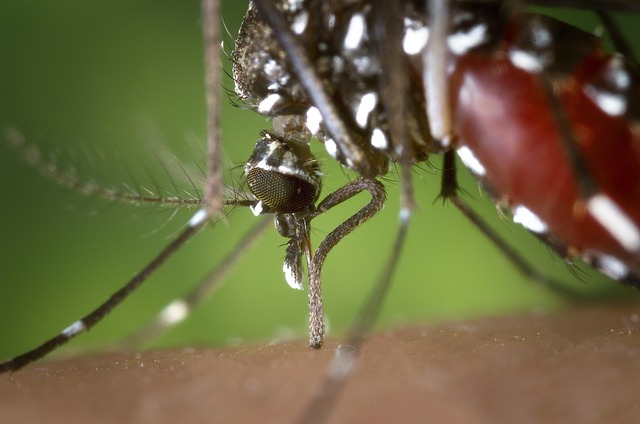
Ouch! What just bit your furry friend?
Mosquitoes are pesky little critters that love to feast on us whenever we step outdoors, but did you know that they have a taste for your dogs and cats too?
Mosquito bites are no fun, so you should learn how to treat mosquito bites on dogs to give your pooch some relief against these annoying insects.
Keep reading for our top care tips and learn more about mosquito prevention in Raleigh, North Carolina, with Innovative Pest Solutions!
Do Mosquitoes Target Your Furry Friend?
Have you ever been outside enjoying a beautiful day with your furry friend, only to be interrupted by pesky mosquitoes buzzing and biting you both?
Well, you’re not alone. Mosquitoes can and do bite both dogs and cats, but they’re not picky when choosing a target. Whether your companion is a loyal pup or a sassy feline, they’re fair game for these blood-sucking insects if they have warm blood.
However, some dogs and cats may be more likely to get bitten than others. Like humans, certain factors can make an animal more attractive to mosquitoes. For example, dogs and cats that are more active or breathe heavily may produce more carbon dioxide and lactic acid.
And let’s not forget about scent. Mosquitoes are attracted to certain smells, such as bacteria on the skin. So, if your dog or cat has a skin infection or tends to have more bacteria on their skin, mosquitoes may be more likely to target it.
But regardless of how attractive your furry friend is to mosquitoes, it’s essential to take precautions to protect them from these blood-sucking insects. Mosquitoes can transmit serious diseases to humans and pets, like heartworms.
So, using pet-safe mosquito repellent products and avoiding outdoor activities during peak mosquito hours can help keep your furry friend safe and comfortable.
How to Treat Mosquito Bites on Dogs
Mosquito bites can be an irritating nuisance for dogs, just as they are for humans. Mosquito bites can cause discomfort, itching, and sometimes even an allergic reaction in dogs. Fortunately, there are several steps you can take to help soothe your dog’s mosquito bites and alleviate their symptoms. Here’s how to treat mosquito bites on dogs!
- Wash the Affected Area
The first step in treating mosquito bites on dogs is to wash the affected area with mild soap and water. This will help remove any dirt, bacteria, or saliva left by the mosquito that can irritate the skin further. If your dog has multiple bites, consider giving them a gentle bath with a pet-safe shampoo to help clean their fur.
- Apply a Cold Compress
After washing the affected area, apply a cold compress to help soothe your dog’s itching and inflammation. A cold, damp towel or ice pack wrapped in a cloth can be used on the area for 10-15 minutes at a time. Repeat this several times a day, as needed.
- Use a Calming Lotion
There are several pet-safe lotions and creams available that can help soothe your dog’s irritated skin. Calming lotions containing oatmeal or aloe vera can relieve itching and redness. Be sure to choose a lotion or cream specifically designed for dogs and avoid any products that contain ingredients that may be harmful or irritating to their skin.
- Consider an Antihistamine
If your dog is experiencing a more severe allergic reaction to mosquito bites, consider giving them an antihistamine. Antihistamines can help reduce itching, swelling, and other symptoms of an allergic reaction. However, talk to your veterinarian before giving your dog any medications to ensure the correct dosage and to rule out any potential interactions with other medications they may be taking. Knowing how to treat mosquito bites on dogs with an antihistamine can mitigate symptoms, but it’s always best to contact a professional for more information.

- Prevent Future Bites
The best way to treat mosquito bites on dogs is to prevent them from happening in the first place. Avoid taking your dog out during peak mosquito hours, typically at dawn and dusk. When spending time outdoors, pet-safe mosquito repellent products, such as sprays or collars. You can also minimize the number of mosquitoes in your yard by removing standing water, a breeding ground for mosquitoes.
- Monitor for Signs of Infection
While mosquito bites on dogs are generally not serious, they can sometimes become infected. Watch for signs of infection, such as redness, swelling, and discharge, and seek veterinary care if you suspect your dog’s bites have become infected.
Mosquito bites on dogs can be treated with home remedies, pet-safe lotions and creams, and potentially antihistamines if needed. The key is to keep your dog comfortable and minimize their exposure to mosquitoes in the future.
While it’s important to know how to treat mosquito bites on dogs, if you have any concerns about your dog’s mosquito bites or their reaction to them, don’t hesitate to consult with your veterinarian.
Preventing Mosquitoes in Your Home & Yard
These blood-sucking insects can not only be annoying, but they can also transmit diseases to both humans and pets. Fortunately, there are several things you can do to prevent mosquito bites. Here are some tips to help you and your furry friend stay bite-free this mosquito season.
- Remove standing water: If you’ve got a bird bath, an old tire, or empty plant pots sitting around, be sure to dump out any standing water. Mosquitoes love to lay their eggs in stagnant water, so removing this breeding ground can greatly reduce the mosquito population around your home.
- Lather on the bug spray: Mosquito repellent is your best friend when it comes to preventing bites. Look for a product that contains DEET or picaridin, and apply it to your skin and clothes for maximum protection.
- Cover-up: If you’re planning to spend time outdoors in areas where mosquitoes are prevalent, be sure to wear long sleeves, pants, and socks to cover as much skin as possible. Consider investing in lightweight, long-sleeved clothing designed to keep mosquitoes at bay.
- Keep the bugs out: To prevent mosquitoes from sneaking into your home, ensure your doors and windows are closed or have screens.
- Use mosquito traps: If you’re looking for a more passive approach to mosquito control, consider investing in a mosquito trap. These devices work by luring mosquitoes in with light or carbon dioxide and trapping them inside.
- Plant mosquito-repelling plants: Certain plants like citronella, lavender, and basil are known to repel mosquitoes. Plant these around your yard or in pots around your home to help keep the bugs at bay.
- Time your activities: If you plan to spend time outdoors, try to do so during the middle of the day, early mornings, or late evenings when mosquitoes are less active.
- Keep it clean: Mosquitoes love to breed in damp areas or with lots of debris. Keep your yard and home environment clean and well-maintained to minimize the risk of mosquito infestations.
Following these tips can help reduce your risk of mosquito bites and keep those pesky bugs at bay. But sometimes, the DIY tricks may not always work well! These pests are hardy and can keep coming back no matter what you try at home.
You know how to treat mosquito bites on dogs, but let us help you keep them away in the first place.
Are you tired of swatting away mosquitoes every time you step outside? Let Innovative Pest Solutions help you take back control of your outdoor space. Our team of experts provides reliable and effective mosquito control services that will keep your family and pets safe from these pesky insects.
Don’t wait until it’s too late – contact us now to schedule your appointment and enjoy a mosquito-free yard this season!






